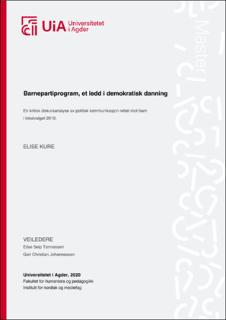| dc.contributor.author | Kure, Elise | |
| dc.date.accessioned | 2020-10-06T09:55:46Z | |
| dc.date.available | 2020-10-06T09:55:46Z | |
| dc.date.issued | 2020 | |
| dc.identifier.citation | Kure, E. (2020) Barnepartiprogram, et ledd i demokratisk danning : En kritisk diskursanalyse av politisk kommunikasjon rettet mot barn i lokalvalget 2019 (Master's thesis). University of Agder, Kristiansand. | en_US |
| dc.identifier.uri | https://hdl.handle.net/11250/2681284 | |
| dc.description | Master's thesis in Social communication (KOM501) | en_US |
| dc.description.abstract | Democracy gives adults and children different rights to influence political processes, where the clearest division is between those who have the right to vote and those who do not. Save the Children Norway organized a separate election for children between the ages of 10 and 15, which provided them the opportunity to vote online. This took place in conjunction with the municipal and county council elections in 2019. For this occasion, the political parties created their own personal children policy programmes. In this master thesis, the empiricism is based on the children policy programmes of Arbeiderpartiet, Høyre and Miljøpartiet De Grønne. Using a critical discourse analysis, inspired by Norman Fairclough, I have done an analysis of the texts at a micro-level and discussed what perceptions of childhood are expressed at a macro-level. In addition, the analysis is complemented by a comparative analysis of the parties' ordinary policy program. In continuation of this, the project aims to contribute insight to the discursive strategies that are used when political parties approach children. The empiricism has been analyzed in the light of an interdisciplinary theoretical framework, and combines perspectives on textual analysis, political communication, adaptation theory and perceptions of childhood. The analysis is guided by the empiricism and, together with applied theory, has provided insights to the political landscape children are presented in policy program for children. The findings show that children policy programmes challenge the established genre: Norwegian partyprogrammes. The discursive strategies used by the political parties highlight their desire to learn, while including children in democracy. The children policy programmes differ from the ordinary policy programmes regarding textual structures, language and argumentation. A consistent, holistic and conscious use of language makes it clear that the texts are adapted. The discourse analysis reveals three prominent discourses that are expressed in children policy programmes: the modern childhood discourse, the Norwegian welfare discourse and the latent party discourse | en_US |
| dc.language.iso | nob | en_US |
| dc.publisher | University of Agder | en_US |
| dc.rights | Attribution-NonCommercial-NoDerivatives 4.0 Internasjonal | * |
| dc.rights.uri | http://creativecommons.org/licenses/by-nc-nd/4.0/deed.no | * |
| dc.subject | KOM501 | en_US |
| dc.title | Barnepartiprogram, et ledd i demokratisk danning : En kritisk diskursanalyse av politisk kommunikasjon rettet mot barn i lokalvalget 2019 | en_US |
| dc.type | Master thesis | en_US |
| dc.rights.holder | © 2020 Elise Kure | en_US |
| dc.subject.nsi | VDP::Samfunnsvitenskap: 200::Medievitenskap og journalistikk: 310 | en_US |
| dc.source.pagenumber | 115 | en_US |

